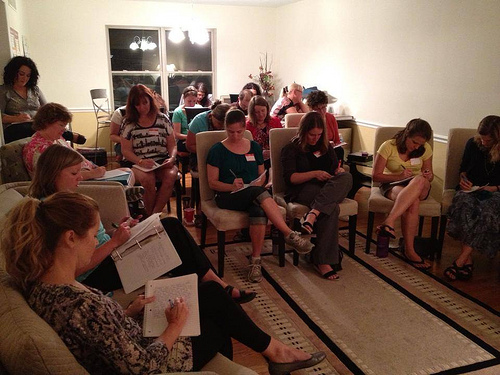
You know the one. Your mother-in-law drops by and suggests that before you serve your son ice cream, you make him spell “ice cream.” (Literally a mom just shared this story with me in email.)
You’re at the Thanksgiving table, and your Aunt Bev springs a pop quiz on your daughter: “What’s 6 times 8, darling? Surely by fifth grade, you have covered the 8s.”
Your best friend (who doesn’t homeschool) looks at your child who is standing off to the side during soccer practice break, singing loudly to herself—arms extended to the sky, and says, “Kylie isn’t comfortable with large groups of kids her own age, is she?”
Sometimes your spouse who works in the education establishment (professor, principle, junior high counselor, fifth grade teacher, AP Psych instructor) blindsides you: “Haven’t you taught Evan the essay? All the eighth graders in our district learned it by Christmas. What curriculum are you using anyway?”
These are the un-standardized tests of home education. Everyone feels free to quiz your kids, to “catch them” in their particular gap, to discover how you (the instructing parent) have come up short as a teacher. It’s uncanny how universal this intrusive practice is! It’s as though everyone feels qualified to prove to you that you aren’t doing as good a job as the brick and mortar schools.
Imagine doing this to a kid who is in school!
The usual conversation usually goes more like this:
Uncle Tom: “What’s your favorite class?”
Kid: “I don’t know.”
Uncle Tom: “You don’t have one?”
Kid: “Um, PE I guess.”
Uncle Tom: “Ha ha. Okay. I get it. You don’t love school. I didn’t either.”
End of discussion. They then fall into talking about their favorite NFL teams.
But with homeschooled kids, rather than ask: “What are you learning that interests you?” The intrusive relative or friend decides to find out if the kid is actually learning anything of traditional school value.
Weirdly, homeschooled kids are far more likely to answer the “favorite subject” question because they usually have one! They often actually like learning the stuff they explore at home.
Let’s fix this. Here are a few ideas to head-off the casual interloping assessor, particularly on anticipated family holidays:
1) Display all evidence of substantial projects and studies. It’s great to have the telescope in the family room, to frame child artwork and hang it on the walls, to bind and publish beautiful copywork or writing and leave it on the coffee table, to hang well drawn maps on the bulletin board, to display science experiments and complicated Lego creations on the mantel, and so on. Say nothing. Let the artifacts speak their silent eloquence to your amazing homeschool.
2) Ask the sympathetic relative to lead the way with questions about a child’s favorite stuff—don’t feel the need to pretend your kid likes medieval history if what he really loves is roller coasters. Simply give that kid the chance to rattle off all he knows about roller coasters. Trust me. It’s always impressive. Homeschool kids self-express with enthusiastic detail when they are passionate about a topic.
3) Encourage your kids to volunteer what they are good at and know well. Prime the pump. Let them know that Grandpa Eli is skeptical about homeschooling and may randomly test them. They can subvert that tendency by offering some well-told stories of their learning adventures (the time they created their own sluice for a pretend Gold Rush, the time they built their own light switch, their book of drawings of WWII tanks, their green belt in taekwondo).
You can’t stop the pop quizzing, but you can be ready for it. The best thing to say when the adult over does it with specific test-type questions is: “We’re on break. No tests allowed!”
Even though this isn’t how you operate, it’s familiar language and usually shuts up the nosey.
Finally, my best advice? Give them pie. That usually does the trick.




















